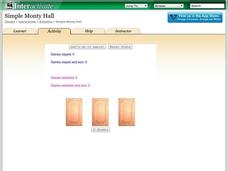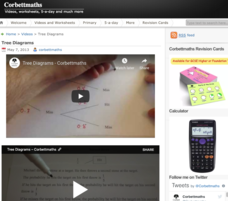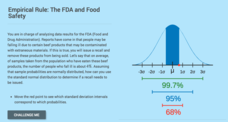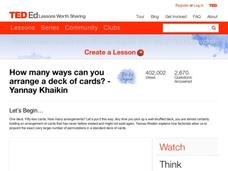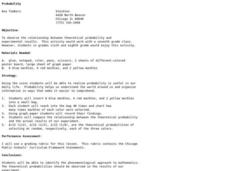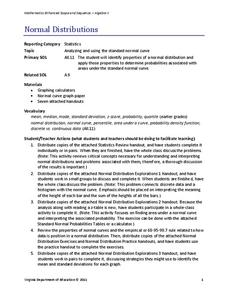Shodor Education Foundation
Spinner
Go round and round to compare theoretical and experimental probabilities. Learners set the number of sectors and the number of spins for a spinner. Then, a table displays the experimental and theoretical probabilities of the spinner for...
CK-12 Foundation
Counting Events: Flipping Unfair Coins
Who said life was fair? An interactive uses an area diagram to represent the probabilities of flipping unfair coins. Pupils use the diagram to calculate the probabilities of outcomes of flipping the two coins. The scholars must decide...
Illustrative Mathematics
Fred's Fun Factory
Spin to win! Individuals calculate the average number of tickets expected based on a probability distribution for the number of tickets per spin. Pupils use that information to determine the average number of tickets that can be won...
Curated OER
Concept: Dice Probabilities
For this probability worksheet, students roll dice to determine the experimental probability of rolling each number on a die. The experiment is repeated using a dice rolling application on their computer. Students find the theoretical...
Shodor Education Foundation
Playing with Probability
Review basic probability concepts with your class using different-colored marbles in a bag. Then pair up learners and have them play a cool online interactive game in which they race miniature cars using the roll of a die or...
Curated OER
Probability Lesson Plans
Here is an article on how teachers can use probability lesson plans to teach their charges about theoretical and experimental probability.
CK-12 Foundation
Theoretical and Experimental Probability: Pizza Night!
Take a bite out of an enticing resource. Scholars use an interactive to study dependent events. They see how the number of favorable outcomes and total number of outcomes changes as individuals "eat" pieces of pizza.
Shodor Education Foundation
Simple Monty Hall
What's behind door number one? A fun resource lets learners simulate the classic Monty Hall probability problem. Pupils choose a door, and after they select a losing door, they decide whether to switch or stay. Using their decisions, the...
Corbett Maths
Tree Diagrams
Climb out on a branch to find probabilities. Using tree diagrams, the resource shows how to find compound probabilities when the events are not uniform. The video works through two different scenarios, one where the probabilities remain...
Balanced Assessment
Dog Tags
Class members demonstrate a proficiency with conditional probabilities through this task. Individuals calculate probabilities using multiplication and addition. They also distinguish between repetition and non-repetition while...
CK-12 Foundation
Additive and Multiplicative Rules for Probability: Red Dress? Blue Dress? Both!
The sum of the parts is greater than the whole. An interactive uses a Venn-like model to show the percentage of females from a survey that have a blue dress, a red dress, or both. The pupils determine the numbers in each category...
Curated OER
Using Arrays to Show Multiplication Concepts
Learners practice multiplication concepts. For this multiplication lesson, pupils make arrays by using counters and solve various multiplication questions. They model arrays with counters for reinforcement.
CK-12 Foundation
Computing Probabilities for the Standard Normal Distribution: The FDA and Food Safety
To recall or not to recall, that is the question. Using provided data, pupils calculate the percent of people that may fall ill on average. The scholars determine the standard deviation based upon the mean and the empirical rule,...
Curated OER
M&M Science and Math
A series of math and science activities feature M&M's® as manipulatives to help kids work through equations. The resource includes exercises on finding averages, percent of compositions, moles in chemical reactions, genotypes and...
Los Angeles County Office of Education
Assessment For The California Mathematics Standards Grade 4
Have scholars show what they know with a 20-page assessment aligned to the California State Standards. The test covers concepts such as large and whole numbers, all four mathematical operations, fractions, decimals, geometric figures,...
TED-Ed
How Many Ways Can You Arrange a Deck of Cards?
Entertain and grab your learners' attention with a short video clip that engagingly teaches the concept of a permutation and how a factorial is a wonderful shortcut for theoretical probability calculations.
Curated OER
Finding Probability
Sixth graders explore the math concept of probability. In this probability lesson, 6th graders examine visual examples of finding probability. Students also practice solving problems that their instructors model.
Curated OER
Probability
Sixth graders explore theoretical and experimental probability. In this probability lesson, 6th graders participate in several hands-on activities involving the comparison of theoretical probability to the actual results. Games include...
Curated OER
Probability
Students explore the concept of probability. In this probability lesson, students flip coins and draw marbles out of a bag to determine probabilities of a particular outcome. Students discuss the differences between experimental and...
Curated OER
Probability
Young scholars explore probability. For this probability lesson, students define theoretical probability and experimental probability. Young scholars predict outcomes of hands on activities using coins and colored tiles,...
Curated OER
Picking Chips: Experimental Probability
Learners apply the concepts of an event occurring to playing a game. In this probability lesson,students differentiate between experimental and theoretical probability.
Curated OER
Probability of Childhood Games
Students explore the concept of probability. In this probability lesson, students find the probability of certain situations including spinning a spinner, drawing marbles from a bag, and rolling a dice.
Inside Mathematics
Winning Spinners
Winning a spin game is random chance, right? Pupils create a table to determine the sample space of spinning two spinners. Individuals determine the probability of winning a game and then modify the spinners to increase the probability...
Virginia Department of Education
Normal Distributions
Pupils work to find probabilities by using areas under the normal curve. Groups work to calculate z-scores and solve real-world problems using the empirical rule or tables.









